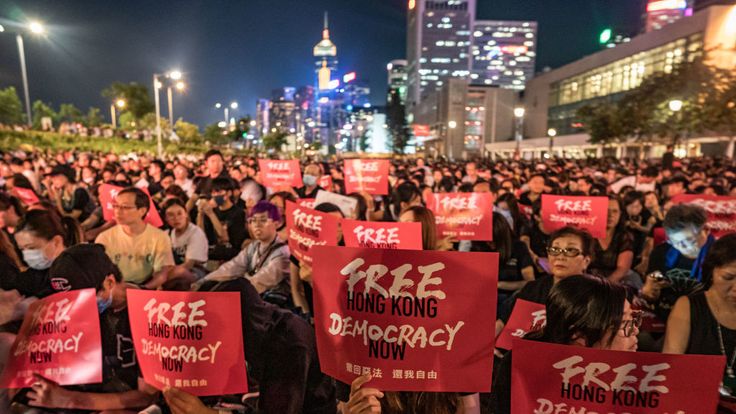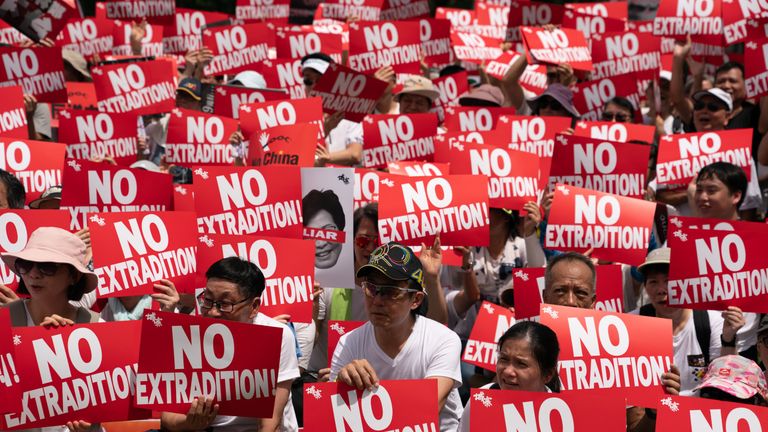Why are people protesting in Hong Kong?

By Philip Whiteside, international news reporter
Protests have been going on in Hong Kong for months. But why did they start and when will they end?When did the protests start?
In February, Hong Kong's security bureau proposed legislation that would allow fugitives to be extradited between Hong Kong and Taiwan, in response to the earlier fleeing of a murder suspect to the territory.The bill would allow authorities to detain and extradite people wanted in countries Hong Kong did not already have agreements with, including Taiwan, but also including mainland China.
With Hong Kong having been handed over in 1997 to China on the basis that it would operate differently to the People's Republic, demonstrators began within days to protest.
But, ahead of the second reading of the bill in the Legislative Council (LegCo) - which is Hong Kong's equivalent to a parliament - the protests escalated.
Who was involved?
Violence ensued and riot police used tear gas and rubber bullets against demonstrators, of which a number were arrested and others had their details taken.
A general strike was called for 12 June, the day of the second reading, and sit-ins were organised, prompting the authorities to close the area around the LegCo.
A stand-off took place between massing demonstrators and police as more tear gas was fired.
What happened afterwards?
On 15 June, territory chief executive Carrie Lam suspended the bill, but did not withdraw it, as protesters had called for, resulting in rising anger.A further mass protest on 16 June saw between 338,000 and two million, depending on the source, attend an even larger march, which resulted in Ms Lam apologising and offering to "accept all criticism" and "serve the public".
But, with the government still not withdrawing the extradition bill, the protests went on, with at least four more before 1 July.
:: Hong Kong protests: Suicides spark mental health fears
What occurred on 1 July?
On 1 July 1997, Hong Kong was handed over by the UK to China, after around 150 years of colonial rule.Some protesters saw an opportunity to use the anniversary to highlight the impact of Chinese control on Hong Kong residents.
After another huge march, and the disruption of the annual flag raising ceremony, at about 9pm hundreds of protesters stormed the Legislative Council building on Hong Kong Island, smashing the glass doors at the front and running into the chamber, where they daubed pro-democracy slogans and erected a colonial era ensign flag - which featured a Union Jack - over the territory's symbol.
Did Carrie Lam back down?
On 9 July, Ms Lam declared the extradition bill to be "dead", which led some to assume it would be withdrawn.But there has been no confirmation the bill will never return to the legislative chamber, which is one of the main reasons the protests have continued.
What was China's reaction to the violence?
China reacted furiously, with its London ambassador telling the UK to keep its "hands off Hong Kong and show respect".He accused the British government of having a "colonial mindset" that "is still haunting the minds of some officials or politicians", telling them "Hong Kong has now returned to the embrace of the motherland", something the then foreign secretary strongly denied.
There have also been claims in pro-Beijing media of CIA and Taiwanese involvement.
:: Hong Kong protests: The police lost the battle, but the war's not over
What's happened since?
Peaceful and violent protests have continued, apparently taking place alongside daily life in the territory.None have been on the same scale as the June protests, but many thousand have continued to be involved.
Among the biggest protests was one in reaction to an attack on dozens of residents, journalists and subway station passengers in the Yuen Long area of the New Territories, close to the border with the mainland, which some have blamed on triads and others have claimed may have been instigated by the Chinese.
Also set up has been a series of "Lennon Walls" - areas of buildings such as the airport or public transport where anti-Chinese and pro-democracy slogans have been painted or written on pieces of paper stuck to the wall.
What do the protesters want?
The protesters are adamant they want to see the withdrawal of the extradition bill, which they fear could lead to Hong Kong residents who legally protest against Chinese activities "disappear".They cite what has happened to several activists, who have gone missing in Hong Kong and ended up being detained in China.
:: How democratic is Hong Kong?
As the protests have gone on, various groups have articulated other demands like the withdrawal of the categorisation of protesters as "rioters", the unconditional release of all those arrested, an independent investigation into police power, and Carrie Lam's resignation.
Some have gone further and called for an end to Chinese interference in Hong Kong and the introduction of full democracy - one adult, one vote.
Will they end soon?
Most of the protests have been met with moderate to strong police action. It appears as though the authorities are reluctant to use hardline tactics.Observers are unsure how long China will stand by for, if the protests continue.
The fear is what Beijing will do if there is any risk the dissent may spread or if it fears the demonstrations could get out of control.
A recent video emerged of Chinese troops being given training in riot control, which some interpreted as a threat.
China has issued its support to Ms Lam and her colleagues and, so far, there are no signs the Hong Kong government will accede to any more of the protesters' demands.












